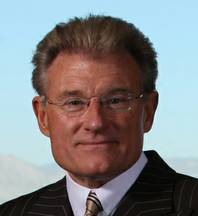Thursday, May 20, 2010 | 6:50 p.m.

Randolph Townsend
Newly appointed Nevada Gaming Commission member Randolph Townsend is offering his experience with the Nevada Legislature — he had been a senator representing Washoe County since 1982 — to keep the gaming industry’s concerns before lawmakers.
Townsend, appointed to the five-member commission to replace Radha Chanderraj, attended his first meeting as a commissioner today and offered to serve as a liaison to lawmakers. But he acknowledged that many lawmakers would be unfamiliar to him because term limits will have removed experienced legislators like him.
Gov. Jim Gibbons appointed Townsend to the commission last month, requiring Townsend to resign his legislative position.
Townsend said he hopes to emphasize how important the gaming regulatory process is to the state.
“Here is a segment of government that is the essence of how we pay for mental health, education and some of these other services, and it has to be done in a manner that requires manpower, expertise and a tremendous amount of diligence,” Townsend said after the meeting.
“This is serious stuff. This is at a level of overcoming the old days, getting us to a level where every (casino) player feels confident they have a chance to beat the house — that perception matches reality, that it encourages — because we have the best skilled management in the world, the best employees in the world and the best service in the world, and it encourages investors to come into this market and put money into the market so we can upgrade facilities and be on the cutting edge of technology.”
The Gaming Commission is the citizen side of Nevada’s two-tiered regulatory process. The three-member state Gaming Control Board is comprised of experts in finance, law enforcement and technology and recommends actions to the commission, which has final say on licensing matters.
Control Board Chairman Dennis Neilander is gaming regulators’ primary point of contact with the Legislature, as he brings legislative proposals to the Legislative Counsel Bureau and defends and explains the agency’s budget.
The commission sets policy that is overseen by the Control Board.
Commissioners, for example, debated the final approval of a new casino game, Dealer Bluff Six Card Poker, which was submitted by Shuffle Master Inc. after a field trial at Wynn Las Vegas.
The Control Board recommended approval of the game in a 2-1 vote earlier this month.
Commissioners eventually approved the game with the understanding that Shuffle Master would modify it before marketing it to casinos. The game is a version of poker that uses a card reader with an artificial intelligence program and a digital scoreboard that tells how strong the dealer’s hand is. The system rates the dealer’s hand and assigns one of four point values and a player must determine whether to continue playing against the dealer after seeing the rating.
But the program can “bluff.” If the dealer has a royal flush, for example, 92 times out of 100 the scoreboard will indicate that it has a strong hand, five times out of 100 it will consider it a second-level hand, two times out of 100 a third-level hand and one in 100, it would call it a weak hand.
Commissioners feared the game would lead to complaints and player disputes, but they liked the idea that artificial intelligence would be introduced to the casino floor in a new poker game.
In today’s meeting, commissioners also got their first look at revisions to the Gaming Control Board’s personnel manual. Todd Westegard, the chief of the Control Board’s administration division, told commissioners there were no major changes in the 58 revisions submitted, primarily coordinating the manual with new federal laws and codifying existing board practices.
Westegard said the manual, which is being submitted as regulatory amendment, hasn’t been revised in 20 years.
Commissioners will consider final approval of the manual at their June 17 meeting in Carson City.
In other business, the commission approved licensing for Jerome Smith as an officer and key employee for Shuffle Master; approved Scott Sibella, president and chief operating officer of The Mirage, for licensure as an officer; Randy Morton, president and chief operating officer of Bellagio, for licensure as a key executive; and Federick Kleisner, CEI and director of the Morgans Hotel Group, for licensure as key executive, director and officer for Morgans and its Hard Rock Hotel subsidiaries in Las Vegas.

Join the Discussion:
Check this out for a full explanation of our conversion to the LiveFyre commenting system and instructions on how to sign up for an account.
Full comments policy